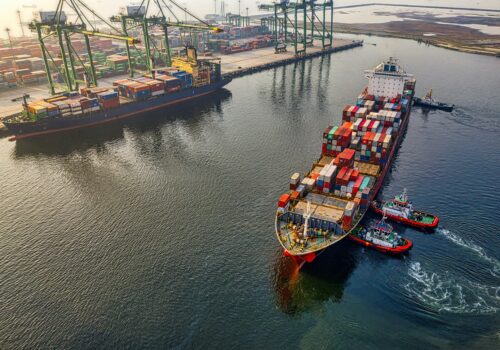What Iran’s attack on Israel means for global energy
Energy markets have shown a muted response to Iran’s unprecedented attack on Israel over the weekend, despite the threat this escalation poses to global oil supplies. But, as Israel weighs its response, the risks to fuel prices and global energy security are extremely high. Our experts comment on what to watch for as tensions rise.
Click to jump to an expert analysis:
David Goldwyn: Energy markets will hinge on Israel’s response
Ellen Wald: Will Iran close the Strait of Hormuz?
Brenda Shaffer: Iran-Israel direct confrontation will last months, not days
STAY CONNECTED
Sign up for PowerPlay, the Atlantic Council’s bimonthly newsletter keeping you up to date on all facets of the energy transition.
Energy markets will hinge on Israel’s response
Energy markets have been pretty sanguine about rising tensions in the Middle East for some weeks. This may not last. The baseline assumptions have been that the Strait of Hormuz will remain open because it is in Iran’s interest to keep them open. Trade in liquefied natural gas (LNG) has been rerouted to avoid Houthi attack in some cases, but Qatar has had a fast pass to deliver to market. Even this week, markets were relieved at the ability of Israel and its allies to repel the Iranian drone and missile attack, and continue to assume that Israel’s response will not attack Iranian oil production.
But the key question is what comes next. Pressure in Israel to respond to the Iranian attack is intense. There is a high risk of confrontation with Hezbollah in the north to mitigate the risk of a short-range missile attack on Israel. And the Israelis are not done with their Gaza operation. Iran has taken what it thinks is a well previewed and measured response to Israel’s strike on its consulate in Syria to end the cycle of response, but neither Israel nor the United States can tolerate Iranian attacks on Israel as the new normal.
Key issues to watch in the next two weeks are: 1) what measures the United States and allies will take to try to forestall an Israeli escalation that could lead to a wider war; 2) whether new sanctions on Iran will target insurance clubs, Chinese banks, or both; 3) whether the United States will dramatically increase targeting of Houthi strongholds as a way of reducing the threat to shipping and retaliating against Iran; and 4) whether Israel will exercise restraint, or whether it will trigger a new round of kinetic activity.
At minimum, shipping costs are likely to increase based on the increased risk of military action in the Persian Gulf, pressure on US and European insurance clubs to avoid any transactions—including those with China—that involve Iranian crude and additional rerouting of oil and gas shipments in response to Houthi threats, or Allied responses. Cooler heads in the United States, Europe, Jordan, Saudi Arabia, and hopefully China will try to head off confrontation that will drive oil and gas prices into triple digits. But they may not prevail….
David L. Goldwyn served as special envoy for international energy under President Obama and assistant secretary of energy for international relations under President Clinton. He is chair of the Atlantic Council’s Energy Advisory Group and a nonresident senior fellow with the Council’s Global Energy Center.
Will Iran close the Strait of Hormuz?
As the conflict between Iran and Israel intensifies, the big question is “will Iran close the Strait of Hormuz”? This narrow waterway must be traversed by all ships exiting and entering the Persian Gulf. According to the EIA, about 21 percent of the world’s liquid petroleum (crude oil, condensate and petroleum products) travels through the Strait of Hormuz, making it the most important oil transit chokepoint.
If Iran shut down transit through the strait, oil supplies would be immediately and significantly impacted. Asia would feel the effects most acutely, as 80 percent of the crude oil and condensate that leaves the Persian Gulf through the strait is shipped to Asian customers.
Iran has threatened this action in the past, but never followed through. Iran isn’t likely to close the strait to Saudi, Kuwaiti, Iraqi, and Emirati oil, because if it did, the United States would immediately deploy naval forces to prohibit ships carrying Iranian oil from exiting the Persian Gulf. Iran is completely dependent on revenue from its illicit oil trade, and if it could not export oil, the government would become immediately insolvent.
Even though Iran’s oil is technically under heavy US sanctions, those sanctions are applied on the buyers of Iranian oil, and those buyers have ways of evading sanctions by masking the origin of the oil they purchase. In addition, the Biden administration has not enforced sanctions violations against Iran’s largest customer, China, in ways significant enough to deter Chinese refiners from buying Iranian oil.
Sanctions enforcement and the security of the Strait of Hormuz go hand in hand. If the United States starts enforcing its oil sanctions more strictly and Iran cannot not find buyers for its oil, then Iran could be motivated to close the strait to shipping, because it has nothing to lose. But if sanctions are not as strictly enforced and Iran continues to generate significant revenue from its oil sales, then it will be motivated to keep the Strait of Hormuz open to all shipping.
At the same time, Iran uses revenue from its oil industry to fund terrorism and unrest throughout the Middle East and beyond. Iran isn’t going to close the Strait of Hormuz unless it has nothing to lose. Insurance costs on transporting oil through the Persian Gulf will likely rise, as the potential for an oil tanker to get caught in the crossfire is now more likely. The risk of short-term spikes for oil prices will remain, but the risk of long-term, elevated oil prices owing to a supply shock from the Middle East is still low.
Ellen R. Wald is a nonresident senior fellow with the Atlantic Council Global Energy Center and the co-founder of Washington Ivy Advisors.
Iran-Israel direct confrontation will last months, not days
The Iran-Israel direct confrontation is not over. Currently, the oil market does not correctly reflect the risks to disruption of oil supplies, especially to Iran’s oil production and exports.
Israel will respond to Iran’s April 13 massive aerial barrage. The timing of Israel’s response will depend on when the proper target emerges. States do not pick a date to attack and then look for targets, rather the opposite. When the proper target is identified, the attack will take place.
Iran’s oil production and export is an attractive potential target, because a severe disruption of Iran’s oil infrastructure will be a strategic loss to Iran—and can be accomplished with few human casualties. Yet, clearly the United States would oppose an attack that would reduce Iranian oil exports. The Biden administration wants as many barrels on the market as possible in an election year to keep the global oil prices low, and has not been enforcing US sanctions on Iranian oil exports. Iranian oil production and exports have grown significantly under the Biden administration. In new Iran sanctions that the administration announced on April 18, reference to oil was conspicuously missing.
An illustration of the administration’s tenacity in keeping foreign barrels in the market, Washington asked Ukraine to refrain from attacking Russian oil refineries, despite the effectiveness of these attacks to slow Russia down. If Israel decides to attack Iran’s oil infrastructure, it will likely wait to do it until after the US November elections. Thus, in assessing the impact of the Iran-Israel confrontation on the global oil market, it is important to assess impact over months and not over days.
Iran’s decision to attack Israel from its own territory, and not via proxies as it has done for over twenty years, is exceptional. The regime in Iran is quite calculating and strategic and this decision to attack Israel does not fit its normal mode of behavior. Iran essentially has no modern navy, no serious air defense, and no air force (most of the planes in is inventory were purchased from the United States and France in the 1970s). In this state, it is surprising that Tehran launched the massive aerial attack on Israel, opening itself up to a counterattack. There are two potential explanations to Iran’s decision. One, Iran may be very close to developing a nuclear weapon (or has succeeded), thus has increased confidence, despite its conventional military inferiority. Or, Tehran may have underestimated US support for Israel and the mobilization of most Arab states to challenge the Iranian attack.
Brenda Shaffer is a nonresident senior fellow with the Atlantic Council Global Energy Center.
Related content
Learn more about the Global Energy Center

The Global Energy Center develops and promotes pragmatic and nonpartisan policy solutions designed to advance global energy security, enhance economic opportunity, and accelerate pathways to net-zero emissions.


